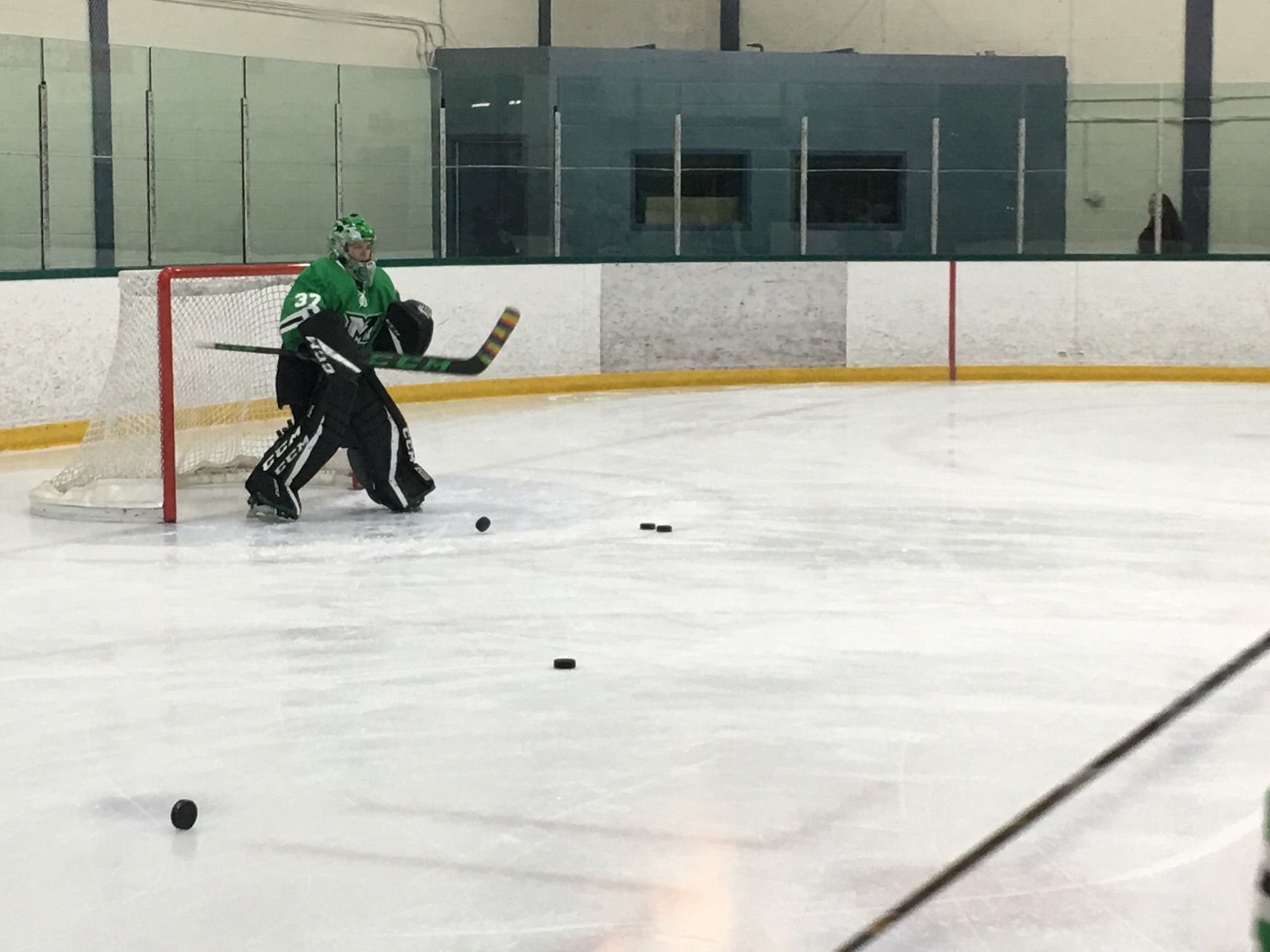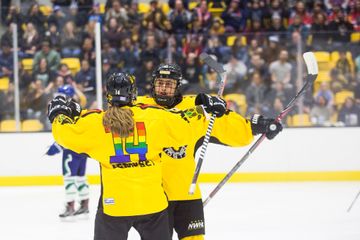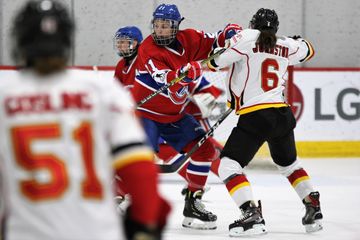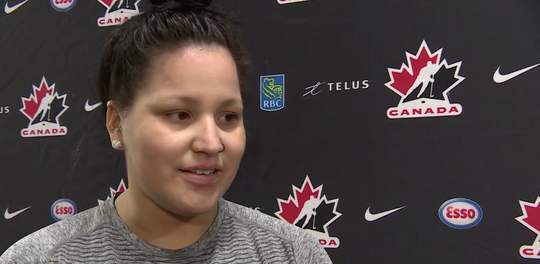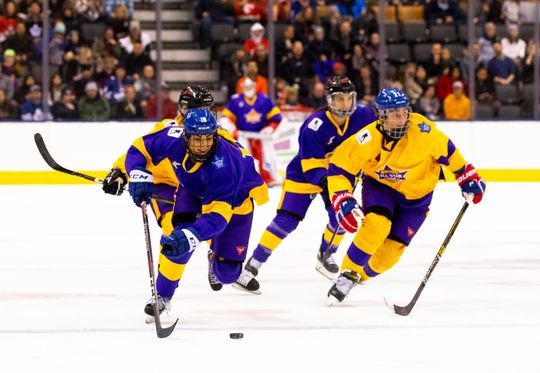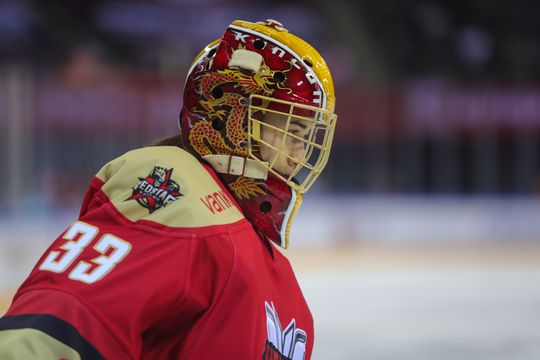Taking the ice at Scotiabank Arena as captain of Team Gold was a dream come true for CWHL veteran Liz Knox. After six seasons with the Thunder (first in Brampton, now in Markham), Knox, or Knoxy as she is known, made her first All-Star Game. If this were just a movie, she might be content to draw the curtain on her playing days.
"It was definitely a highlight of my entire career to be able to be there. And to be captain just made it that much more special," Knox told the Victory Press via phone last month. Coming from the community of Stouffville to now playing professional women's hockey not even 25 minutes away is surreal. It has made Knox consider if the universe is aligning things to prepare for the perfect retirement. However, goalies by nature think one save at a time, and Knox is all about living in the now.
From playing for the Markham-Stouffville Junior Stars, Knox went on to win four Ontario University Athletics (OUA) titles with the Wilfrid Laurier Golden Hawks. She finished her college career with a 90-7-2 record and was inducted into the Laurier Athletics Hall of Fame in 2016.
A Hall of Fame induction, a second professional title in 2018 with Markham (after winning the Australian Women's Ice Hockey League in 2014), and winning the 2019 CWHL All-Star Game is quite the resume for the 30-year old netminder. Yet, there is more on the horizon for Knox, including an important role as part of the CWHL Players Association.
Although the All-Star Weekend was mostly fun, there was some backlash about media accommodations. Knox offered her opinion on the matter in a Twitter post:
My two cents @TheCWHL pic.twitter.com/JhTYGa5Xk7
— Liz Knox (@27Knoxy) January 22, 2019
"Because I'm on the PA, I'm very conscious of what's happening in media and how our league is being represented and presented to the public," she told The Victory Press. Therefore, when she was made aware media wasn't allowed access to the All-Star Draft, she went to Commissioner Jayna Hefford and league staff to understand the situation, in the case she'd be asked for a comment.
"I just said, 'Hey guys, what's going on?' And Jayna just flat out said, 'You guys do so much to promote our league and promote women's hockey issues. I wanted the draft to just be about you guys.'"
The response made Knox reflect for a moment on all she and her peers do (for free, as she noted in her post). Closing the draft was presented as an attempt – although perhaps not a well-communicated one – to give the players some league-only time.
"We love being a face in the public, we love spreading awareness about women's hockey. But I thought how kind of [Hefford] to just say, you know for one night let's just let the players enjoy each other, have some food, have some drinks, and just get to sit down and chat with each other."
For Knox, it was a nice touch. However, she understands where the confusion and discontent came from. "We certainly do appreciate the media and all they do for us because they're very much in the same boat as us – it's not the most lucrative position to hold in the world – but in the end, they're dedicated," she said. "They put in a ton of hard work and I just wanted to clear the air because it came from a really good place and I wanted to make sure that people knew that."
Being the person to request clarification on league decision is a role Knox has embraced recently. She has served as co-chair of the CWHL Players Association for the past two seasons. While the PA existed before, Knox and others saw value in reviving the group once the CWHL expanded to China.
After a month, still more questions than answers re expansion incl. on league fairness and player stipend amounts. Excited to know more soon
— CWHLPA (@CWHL_PA) July 25, 2017
"The players association was started close to 10 years ago by Jayna Hefford, Ally Fox, and I believe Sami Jo [Small] was on at the time as well... the players at that time basically said if we're going to have all of these changes as we're becoming the CWHL, it's important that the players' voice is heard," she said.
As players across the league stepped away for Hockey Canada centralization ahead of the 2018 Winter Olympics, a PA position opened up and Knox threw her name in. It's one thing to complain, but another to get into a position to make a change. Knox was ready to do less of the former and more of the latter.
In her time on the PA, Knox has dealt with expansion to China and the consequential inequity of salaries between "ambassadors" playing overseas and salaries for Canadian-based players. She has also been part of the growing conversation about one women's league in North America. Those two things, along with Hefford replacing the first-ever CWHL Commissioner Brenda Andress, led to a re-evaluation of the purpose and presence of the CWHLPA.
"[The NWHL and CWHL] are both pioneering the game right now, and both in unique ways and it's put pressure on us to kind of re-evaluate," she said. "Is the way that we've been doing it all along the best way? What can we learn from each other? How can we grow?"
As things change in the Canadian league, it could be an opportunity for the CWHLPA – or whatever players' association exists under one united North American league – to be better. Or at a minimum, for starters, a become proper union.
Neither the NWHLPA or CWHLPA is truly separate from its respective league – in other words, they are not formally unionized. This means that they do not have as much leverage when negotiating salaries and compensation. Other concerns such as player safety, rulebooks and rule enforcement, and trade rights are topics players in both leagues have struggled to address. Discussing, criticizing, and negotiating with one's employer without a third-party representative can be overwhelming.
Last year I got 22 PIMs and a game suspension for leaving my crease but THIS isn’t a concern for players’ safety? pic.twitter.com/8wSAtQiNk5
— Liz Knox (@27Knoxy) January 27, 2018
The NHLPA has recently become a resource for the CWHL players. While the partnership seems to be more in the way of financial support – overhead for end-of-season award bonuses, sponsorship of the CWHL All-Star Weekend, etc. – the NHLPA has also been helpful in other ways. "Honestly, when all the China teams joined our league and players were asking a lot of questions at the time, I met with a representative from the NHLPA with our commissioner at the time and she was very open and honest with me," shared Knox. "I could ask questions like 'How does your PA go about you know if players aren't happy about this?' Or questions about financial structures and what leverage points we have here."
For the Thunder netminder, the biggest takeaway from the conversation was learning to find the compromises. It is worth noting, however, that former commissioner Brenda Andress was also in that meeting. It will be interesting to see if and how a proper players union for the CWHL, the NWHL, or any singular women's hockey league, establishes itself.
Overall, Knox is pleased with what she and others do to create uplift the voices of the players in the Canadian Women's Hockey League. Additionally, Jayna Hefford’s position as interim commissioner, from Knox's perspective, is a good thing: "She has such a well-rounded understanding of what players have been through and are going through and she makes a noticeably conscious effort to take players opinions into consideration and try to make just the experience overall better... The dialogue between the PA, and our commissioner, and our director of hockey ops now is different in that [Hefford] understands where it's coming from and she understands that it is a conversation."
Liz Knox has confidence in women's hockey players. Whether dealing with #OneLeague, new commissioners, or even the social media outbursts about too many men involved in the CWHL All-Star Game, she says the women's game won't drastically change for one good reason.
"I think the thing people fear is that somebody is going to come in and turn this into something that it hasn't been. Or turn this into something that it's not. At the end of the day, it just won't happen because the players will not play for something that they don't believe in," she said.
It is an interesting comment, as we continue to see players – for a number of reasons – cycle in and out of the CWHL, the NWHL, and the women's leagues in Sweden and Russia. Ultimately, Knox believes players will dictate the ultimate success of any given league: "All we've ever had is that we believe in the women's game. We believe in playing for our country. We believe in representing our teams well. If somebody, anybody, male or female, were to come in and do something that the players didn't believe in, it just wouldn't work."
It is worth noting that most players must have jobs off the ice and close enough in proximity to any given women's hockey market to even have professional hockey careers. A unified North American league would need to sort out salaries, housing, and other supports to be a truly viable option for hockey players as their single job.
While many see the NHL as a magic cure for all women's hockey woes, NHL commissioner Gary Bettman's interest in the women's game is confusing, if not outright troubling. So too were the reactions to Kendall Coyne Scofield participating in the 2019 NHL Skills Competition, as a recent example.
However, the optimism of Knox is inspiring. Perhaps she has one more career milestone to complete before hanging up the goalie pads. It might not be a battle fought on the ice, but it could be the one of most importance for the future of the game.
